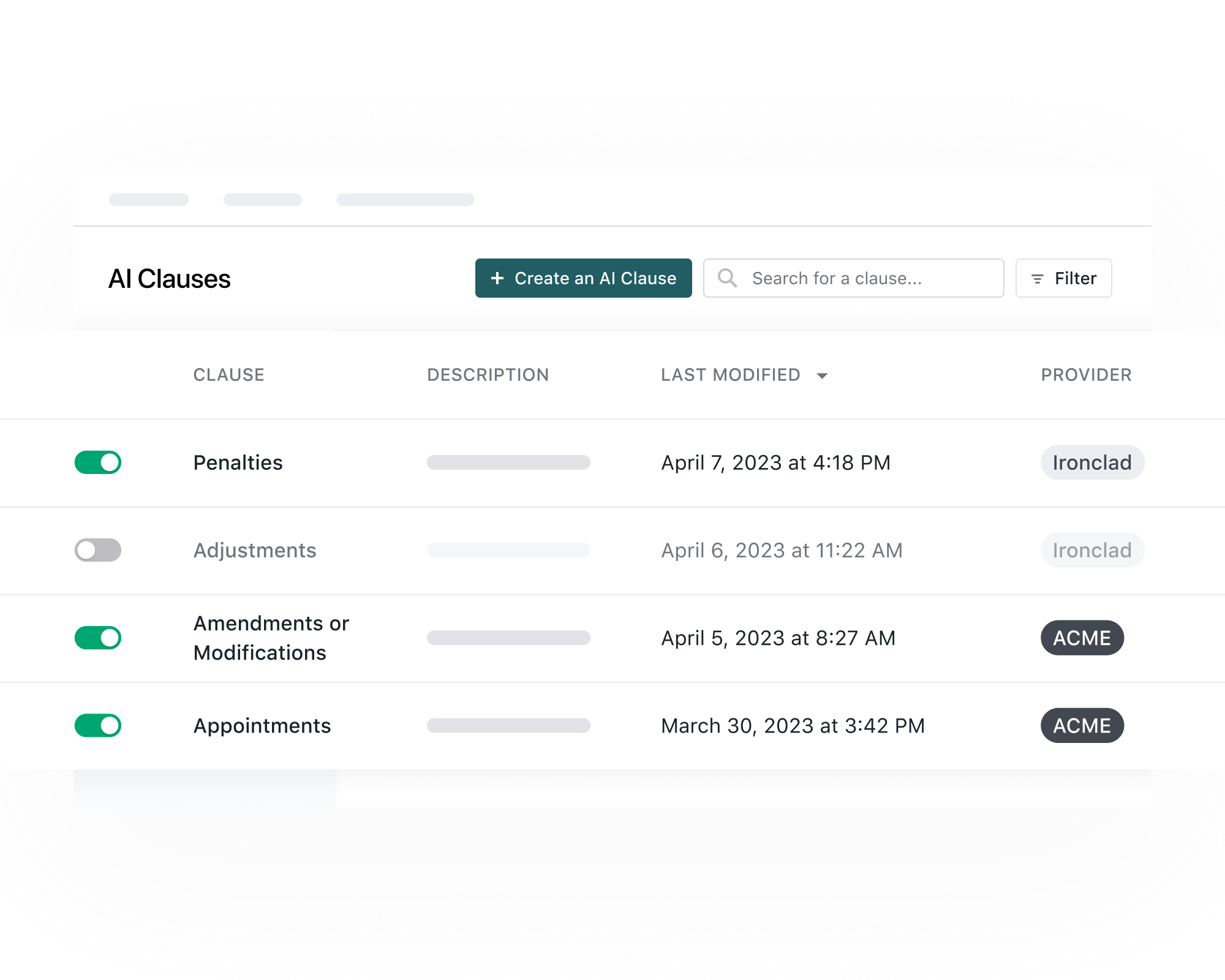
Ironclad AI Assistant: Complete Buyer's Guide
Enterprise-focused contract lifecycle management platform
Ironclad AI Assistant is an enterprise-focused contract lifecycle management platform that leverages GPT-4 technology to automate contract review and redlining processes for corporate legal teams. It positions itself as a comprehensive solution combining AI-powered contract analysis with end-to-end workflow automation, targeting organizations handling substantial contract volumes rather than bespoke legal negotiations [41][52].
Market Position & Maturity
Market Standing
Ironclad maintains a strong enterprise market position with documented Fortune 500 adoption including L'Oréal, Snap, and Mastercard, demonstrating credibility among large organizations with complex contract management requirements [52][58].
Company Maturity
The company demonstrates operational maturity through comprehensive platform capabilities spanning contract creation, negotiation, execution, and management, positioning beyond point solutions toward integrated contract lifecycle management [41][46].
Growth Trajectory
Growth trajectory indicators include expanding Fortune 500 customer base and platform evolution from basic contract management to AI-powered automation, though specific revenue or funding metrics require verification from public sources [52][58].
Industry Recognition
Industry recognition emerges through customer case studies and documented implementations rather than analyst awards, with measurable outcomes like 70% processing time reduction and $500,000+ annual savings providing market validation [52].
Strategic Partnerships
The vendor's strategic partnerships with Salesforce, Microsoft, and DocuSign demonstrate ecosystem integration capabilities that enhance market position relative to standalone solutions [46][50].
Longevity Assessment
Long-term viability assessment suggests stable market position based on enterprise customer retention and platform evolution, though organizations should evaluate vendor roadmap alignment with emerging AI capabilities and regulatory requirements.
Proof of Capabilities
Customer Evidence
Enterprise Customer Validation demonstrates Ironclad's effectiveness across diverse industries and use cases. Mastercard's implementation consolidated 100+ contract templates into three workflows, achieving 70% processing time reduction and $500,000+ annual labor cost savings through comprehensive workflow automation [52].
Quantified Outcomes
Quantified Performance Metrics include 2-minute contract redlining versus 40 minutes manually, representing 95% time reduction in initial contract review processes [41].
Case Study Analysis
AppDynamics achieved 100% compliance adherence to Cisco's reseller agreements through automated rules-based guardrails, preventing contract generation unless required data is entered in Salesforce [54].
Market Validation
Market Adoption Evidence spans Fortune 500 companies including L'Oréal and Snap, with 4.5/5 G2 rating and 4.4/5 Capterra rating reflecting customer satisfaction despite implementation complexity [45][50][58].
Competitive Wins
Competitive Displacement occurs primarily against manual processes and basic contract management systems rather than specialized AI tools, with customers choosing Ironclad for integrated workflow automation rather than superior contract analysis capabilities compared to tools like Kira Systems [9][16][29].
Reference Customers
Reference customers include Fortune 500 companies such as L'Oréal, Snap, and Mastercard [52][58].
AI Technology
Ironclad's AI Assist™ technology combines generative editing capabilities with company-specific playbook training, enabling precise redlining based on organizational contract standards rather than generic rules-based approaches [41][49].
Architecture
The technical architecture centers on browser-based Word editing with track changes integration, maintaining familiar interfaces while adding automated clause detection and suggestion capabilities [41].
Primary Competitors
Primary Competitors include specialized contract analysis tools like Kira Systems and Luminance, comprehensive CLM platforms, and integrated legal technology suites [9][16][29][32][40].
Competitive Advantages
Competitive Advantages center on native Salesforce integration providing significant advantages over competitors requiring complex API configurations, particularly for organizations with established CRM workflows [46][50].
Market Positioning
Market Positioning targets the intersection of contract analysis and workflow automation, competing against both specialized AI tools and comprehensive CLM platforms.
Win/Loss Scenarios
Win/Loss Scenarios favor Ironclad for organizations seeking integrated solutions with established Salesforce workflows and substantial contract volumes requiring standardization.
Key Features

Pros & Cons
Use Cases
Integrations
Pricing
Featured In Articles
Comprehensive analysis of AI Clause Extraction for Legal/Law Firm AI Tools for Legal/Law Firm AI Tools professionals. Expert evaluation of features, pricing, and implementation.
How We Researched This Guide
About This Guide: This comprehensive analysis is based on extensive competitive intelligence and real-world implementation data from leading AI vendors. StayModern updates this guide quarterly to reflect market developments and vendor performance changes.
59+ verified sources per analysis including official documentation, customer reviews, analyst reports, and industry publications.
- • Vendor documentation & whitepapers
- • Customer testimonials & case studies
- • Third-party analyst assessments
- • Industry benchmarking reports
Standardized assessment framework across 8 key dimensions for objective comparison.
- • Technology capabilities & architecture
- • Market position & customer evidence
- • Implementation experience & support
- • Pricing value & competitive position
Research is refreshed every 90 days to capture market changes and new vendor capabilities.
- • New product releases & features
- • Market positioning changes
- • Customer feedback integration
- • Competitive landscape shifts
Every claim is source-linked with direct citations to original materials for verification.
- • Clickable citation links
- • Original source attribution
- • Date stamps for currency
- • Quality score validation
Analysis follows systematic research protocols with consistent evaluation frameworks.
- • Standardized assessment criteria
- • Multi-source verification process
- • Consistent evaluation methodology
- • Quality assurance protocols
Buyer-focused analysis with transparent methodology and factual accuracy commitment.
- • Objective comparative analysis
- • Transparent research methodology
- • Factual accuracy commitment
- • Continuous quality improvement
Quality Commitment: If you find any inaccuracies in our analysis on this page, please contact us at research@staymodern.ai. We're committed to maintaining the highest standards of research integrity and will investigate and correct any issues promptly.